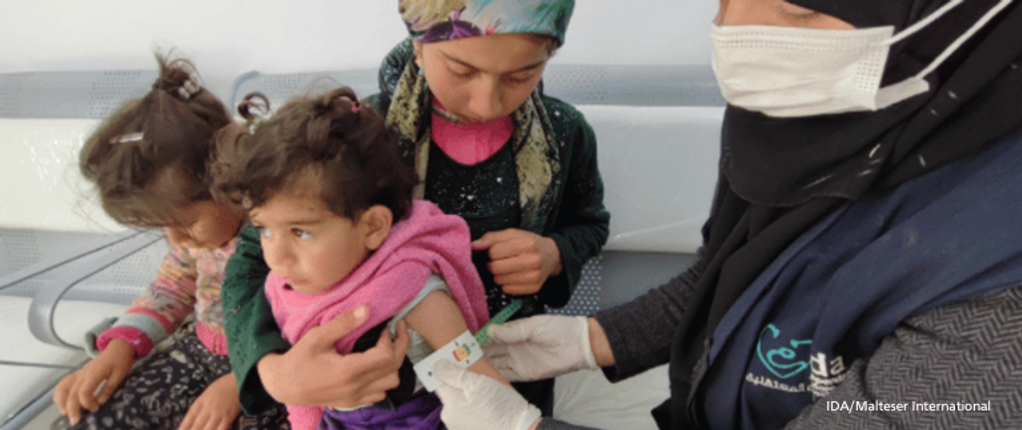
Strengthening the resilience of communities in northwest Syria through health, mental health and psychosocial support, and nutrition
In the midst of conflict, natural disasters, and socioeconomic challenges, Syria is facing a significant impact on its health sector. According to the World Health Organisation, more than 15 million people are in urgent need of medical assistance (as of 2024). More than half a million children are chronically malnourished, and non-communicable diseases are a major health concern, particularly among displaced communities. The situation, already tense due to years of conflict, was exacerbated by the earthquakes in February 2023.
The healthcare infrastructure in northwest Syria requires extensive maintenance and rehabilitation to provide a minimum level of services. Due to displacement, attacks, injuries and flight, there is a constant shortage of health personnel. The public health system has collapsed. Many hospitals and medical facilities were destroyed during the war, the power supply is inadequate and there is a shortage of medicines, consumables, and medical personnel.
To strengthen the resilience of communities in northwest Syria, we are applying an integrated and multi-sectoral approach that combines health, MHPSS (mental health and psychosocial support), and nutrition.
The health system in northwest Syria has been severely damaged which impacts the quality as well as the accessibility to health services for a large part of the Syrian population in the area. In addition to the consequences of the war, the cholera outbreak and COVID-19 constituted significant challenges regarding health-services delivery. Multiple social, environmental, political, and economic factors have highlighted health issues in the area. Nutrition-related health problems and mental health concerns are particularly common, especially after years of conflict, compounded by the recent earthquake.
According to the WHO, 64% of 207 public hospitals were classified as fully functional, 16% as partially functional and 19% as non-functional. Of 1785 public health centers, only 52% were fully functional, 24% partially functional and 24% completely out of order (as of 2023). Since the beginning of 2024, the situation of the health centers has deteriorated enormously, especially because funding opportunities are disappearing. By the end of July, 110 health centers, including 34 hospitals, had already partially or completely ceased operations in northwest Syria.
We aim to provide life-saving and life-sustaining services to both internally displaced persons (IDPs) and the host community in northwest Syria. We improve access to essential health services by combining health with nutrition, mental health, and psychosocial support services, to reduce the vulnerability of the people affected in the region. In cooperation with local partners, we provide health services 12 secondary and 9 primary health facilities.
-
Outpatient services in basic health stations and hospitals, such as general medical examinations, treatment of malnutrition in children, and/or vaccinations.
-
Support of hospitals where modern diagnostic procedures and specialist treatments are performed, e.g., in the fields of emergency medicine, internal medicine, pediatrics, surgery, orthopedics, ear, nose and throat, ophthalmology, neurology, and urology as well as emergency medicine and trauma care.
-
Provision of primary and secondary child and maternal health services.
-
Provision of intensive care units, thalassemia, and dialysis units.
-
Provision of ambulances and patient transport systems so patients can be referred for more advanced care.
-
Procurement of medicine and medical consumables.
-
Distribution of medicines and personal protective equipment to health facilities.
-
Support in the area of mental health and psychosocial care.
-
Deployment of health workers in communities and health posts for health education and early detection of diseases and malnutrition.
-
Capacity strengthening of the health system by implementing health data management systems.
Country info
Capital: Damascus
Area: 185,180 km²
Population: approx. 23.23 million
Project data
Financing: German Federal Foreign Office (GFFO), DG ECHO and Germany's Relief Coalition (ADH)
Partner: Hand in Hand for Aid and Development (HIHFAD), Independent Doctors Association (IDA), Syrian American Medical Society (SAMS)
Duration: July 2024 - June 2025








